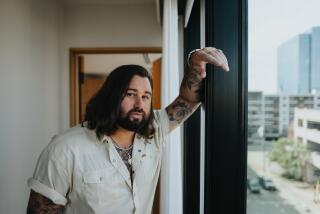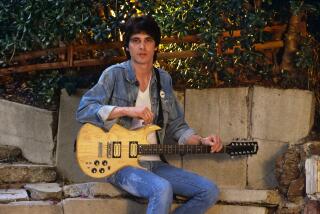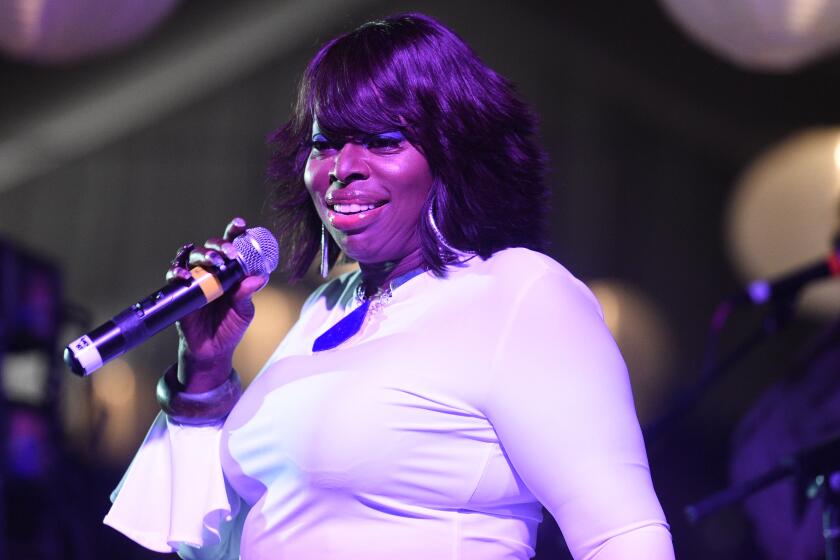On the Road Again, Bassist Entwistle Is Still Mr. Cool
- Share via
Following you, I climb the mountain. I get excitement at your feet.
--from the rock opera “Tommy”
As the bassist of the Who, John Entwistle climbed the highest mountain of rock stardom, stood on the most prominent stages from Woodstock to the Metropolitan Opera House and saw as much excitement in the crowds at his feet as any rock band has ever created.
But if Entwistle’s thunderous virtuosity on the bass guitar remains Olympian, the settings in which he now exhibits it are a long way from Woodstock. Last Thursday Entwistle stood on the low stage of the Strand, a dinner and dance club in Redondo Beach, while a sound crew headed by former Who roadie Bobby Pridden puzzled over a balky electrical system that was making a shambles of the John Entwistle Band’s pre-show sound check. Singer Henry Small fumed over a succession of blown fuses.
But Entwistle, entirely in keeping with his old Who image as the immobile, unflappable anchor of the world’s most tumultuous live band, took it all in stride.
In the Who he was known as “The Ox” and “The Quiet One.” While guitarist Pete Townshend, drummer Keith Moon and singer Roger Daltrey carried on a nonstop circus of athletic leaps, arm-windmilling, madcap drum-kit abuse and microphone-cord lariat tosses, Entwistle would stand off to the side and self-containedly play his instrument.
Midway through his first substantive tour since the Who’s 1982 retirement, Entwistle, who plays tonight at the Coach House in San Juan Capistrano, wasn’t about to let anything perturb him: not his lack of a record deal for an already-recorded new album, not the cold he was nursing, not the after-effects of an overnight drive from Scottsdale, Ariz., to Redondo Beach and certainly not a little problem with the circuit breakers.
After the aborted sound check, as Entwistle sat nibbling on shrimp and red snapper and sipping a glass of milk, he spoke with low-key affability about his legendary old band and his scuffling new one.
At 43, Entwistle is tall and lean, but he has the craggy, grizzled, weatherworn look of a boulder that has spent its existence jutting from a stormy promontory.
After 25 years as the stolid man of rock, Entwistle said, he can’t see much point in switching to a new, more animated persona.
“The audience has an image of me, and I don’t see any need to exude personality. They’ve already got my personality in mind,” he said in a soft, deep voice made even lower by his head cold.
So even though he is now the leader of his own band, Entwistle still stakes out territory away from center stage. He stands there in front of a high stack of amplifiers, holding the Buzzard, a bass of his own design that has a long, red body and a black, beaked head shaped like a vulture’s.
The instrument is one of 160 basses and guitars that Entwistle says he owns--down from a peak of 260. One of his basses, a flame-shaped model, recently netted $28,000 at a Sotheby’s auction. Entwistle, who lives in a 19th-Century mansion in Gloucestershire, England, said he has pumped the proceeds from the sale of part of his bass collection into building his own recording studio.
“When I was a kid, I couldn’t afford to buy a decent bass,” Entwistle said. “I went around looking at Fenders in store windows, wishing I could have one. That was sort of my desire in life. When I could afford it, I bought one, and I just kept going.”
Entwistle put his instruments to revolutionary use. In the 1960s, he, more than any other rocker, transformed the bass from a mere time-keeping device, a humble musical creature of predictable habits, into a wild, braying mastodon that fed on massive amplifier wattage and fought on more-than-equal terms over the habitat of a song.
Despite his reserved image, Entwistle said he sacrificed several instruments to the early Who’s attention-getting stage ritual of smashing their gear at the end of a show. “I smashed five or six on stage. I actually smashed six others in hotel rooms because I couldn’t get them to play the way I wanted to,” Entwistle said.
He also says he was not entirely an innocent bystander in Keith Moon’s legendary demolitions of hotel rooms. “I shared rooms with Keith. It was our room that was trashed. I’d let him take the blame for it,” Entwistle said. He recalled occasions when he and Moon, who died 10 years ago from an overdose of prescribed sedatives, would be calmly entertaining girls in their hotel room when, “suddenly Keith would go berserk and trash the room. I’d watch the girls’ expressions as they ran out of the room screaming.”
Portraying life’s horrific little surprises with sardonic black humor became Entwistle’s forte as a songwriter. His early signature tune was “Boris the Spider,” an account of an eerie-but-funny encounter with an ill-fated arachnid. (Entwistle still wears a large, elaborate spider pendant around his neck, the original of which he says was a gift from Keith Moon.)
When Townshend needed sinister villains to spice the plot of “Tommy,” he turned to Entwistle, who obliged by writing the songs featuring Tommy’s sadistic Cousin Kevin and his perverted Uncle Ernie. Later, inflating a real-life domestic spat he had with his wife, he wrote another Who standard, “My Wife,” the funny story of an errant husband on the lam from a murderous spouse.
Besides contributing a solid song or two to most of the Who albums, Entwistle released five solo albums between 1971 and 1981. The first, “Smash Your Head Against the Wall,” is an overlooked tour de force of dense, hard rock that focused on diabolic themes with tongue firmly in cheek. It includes “Heaven and Hell,” which became a staple of the Who’s live shows.
These days, Entwistle says, melodies come more easily to him, but it is harder to find song subjects. When he finishes his U.S. tour, he said, he will try to come up with some new material for a planned October reunion of the Who, whose members will gather in a recording studio to see whether they have another album in them.
“All we agreed to was to go in the studio in October to see how we got on with recording an album,” Entwistle said. “It’s to see if we can get on musically. Pete got to the point where he felt he couldn’t write songs for the Who. Now that the Who’s been broken up five years, he feels a little differently about it.”
Rather than an attempt to resurrect the Who, Entwistle sees the recording sessions as a chance to give the band a proper burial. “I don’t think any of us were satisfied with the last two albums we put out (“Face Dances” and “It’s Hard”), but that’s where we were at the time. This gives us another chance to go out with a bang instead of a fizzle.”
Entwistle said there appears to be little prospect of live shows by the Who, which recently regrouped to sing three songs at a British record industry awards event where, as Entwistle dryly put it, “We got the old ‘go-away-and-die’ award for our services to the phonographic industry.”
The prospect of another Who album is double-edged. It could be the final bang Entwistle envisions, but it also could be the rock ‘n’ roll equivalent of Muhammad Ali’s ill-advised dud of a comeback fight against Larry Holmes: a dull bout that ended a great heavyweight champ’s career on a sluggish, embarrassing note.
Entwistle thinks that the members of the Who will be able to gauge their music’s vitality better than an aging athlete can judge his comeback prospects. “We’ve got a couple of months to realize whether it’s right or wrong. We’ll know within the first weeks whether we have a good album or not.”
Meanwhile, Entwistle is trying to re-establish his own performing career after a long post-Who layoff.
“In the early days (after the Who broke up), people didn’t bother to call me. They figured I’d say no, because I am a high-profile bass player. In reality, I’d have said yes to anything because I was getting so bored.” The only offer, he said, came from Steve Hackett, the former Genesis guitarist, when he and Steve Howe of Yes were forming the guitar super-group, GTR. Entwistle turned them down because “I didn’t think our music would marry up.”
It took several years for Entwistle to put his own band together. “I had to find people who would influence the songs, to counteract my Who thing” in hopes of creating a band with a sound of its own.
The lineup that recorded the album Entwistle currently is shopping included Zak Starkey, Ringo Starr’s son, on drums. But Entwistle said that Starkey became involved with another band. He has been replaced by Steve Luongo, formerly of Rat Race Choir, a New York City club act that played carbon-copies of Who originals. After meeting Rat Race Choir at a musical equipment trade show last year, Entwistle linked up with them to play a benefit and a brief fall tour of the northeast that was devoted strictly to Who songs.
The other members of the John Entwistle Band are singer Small, formerly of the Canadian band Prism; Mark Adams, a San Francisco-based guitarist, and Tim Gorman, the veteran keyboardist who accompanied the Who on the band’s 1982 farewell tour. Entwistle said that their prospective album includes four new songs of his own, and six songs co-written by Small and Adams.
Entwistle, who keeps a bass in his bedroom for a regimen of every-other-day practice sessions, said he is eager to show off his massive, but underused technique once more.
“When I hear a lot of heavy metal bands, I can hear my bass parts coming out,” he said. “I feel proud that I wrote these riffs and they’re still being used. That makes you feel good. What makes you feel bad is that you’re not out there playing them.”
Lately, although he is virtually starting over at mid-life, playing his smallest venues since the Who’s early days as mainstays of London’s Marquee Club, Entwistle has had reason to feel better.
“When I do a gig, people shout out, ‘Don’t ever stop,’ and as long as people keep shouting that, I’ll carry on. It keeps me alive. It keeps me happy. I don’t feel that because I’m over 40 I should stand aside. I’m going to play until I decide that I’m not good enough to play any more. And I don’t think that’s going to happen.”
The John Entwistle Band plays tonight at 8 and 10:30 at the Coach House, 33157 Camino Capistrano, San Juan Capistrano. Tickets: $16.50. Information: (714) 496--8930.
More to Read
The biggest entertainment stories
Get our big stories about Hollywood, film, television, music, arts, culture and more right in your inbox as soon as they publish.
You may occasionally receive promotional content from the Los Angeles Times.











